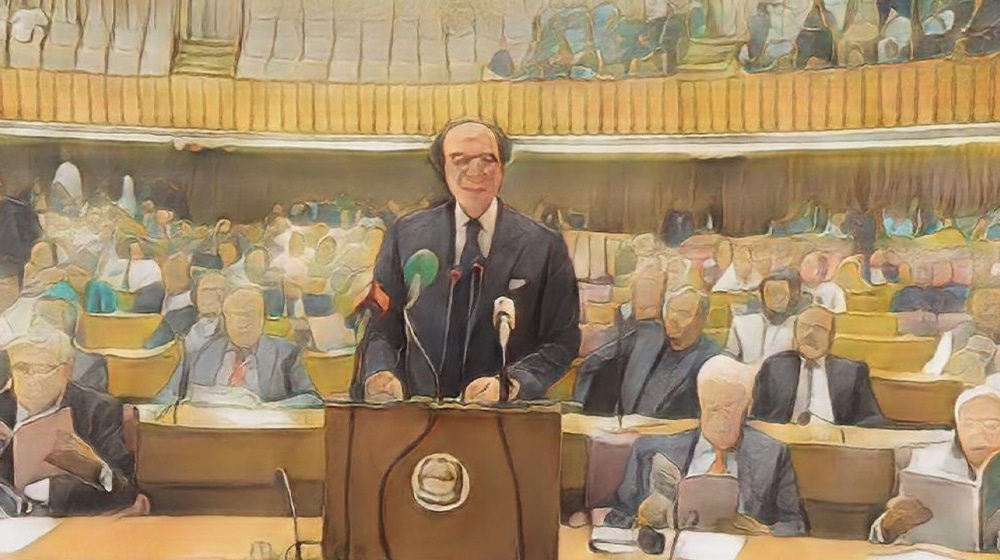
Pakistan on Friday quickly passed the IMF-made Federal Budget 2024-25 with some 11th-hour tweaks that effectively doubled the tax rate on salaried class, made air travel at least 40 percent more expensive, increased petrol and diesel prices, and imposed a punitive 10 percent surcharge on high salaries. Many in Pakistan call this disastrous while the Washington-based lender still believes it isn’t enough.
We need to understand a few things here. While increasing taxes in the new budget might seem like a solution, it will backfire, as seen recently in Kenya. Spending cuts, too, have their limits given our overwhelming debt burden.
The Federal Budget 2024-25 offers absolutely no room for the government to even imagine such a scenario where it could successfully and peacefully reprofile its debt to ease the tax burden on those living paycheck to paycheck. The salaried class is screwed.
The 10 percent surcharge is essentially just a penalty on top earners over the already extortionate 35 percent standard tax rate on their annual gross income. Additionally, a new progressive tax regime for property transactions has been introduced, where filers will pay a minimum of Rs. 4 million on properties worth Rs. 100 million, and non-filers will be hit with at least Rs. 10 million on similarly valued properties.
Mobile phones, too, are not spared. Those worth less than Rs. 140,000 will face an 18 percent additional tax, while phones exceeding this value will be taxed 25 percent.
The standard milk/fat-filled milk rate will now include an 18 percent sales tax. Will babies move abroad?
Exporters will now be part of the normal tax regime i.e. they will pay 29 percent corporate tax + applicable super tax on their export income.
Individuals and Associations of Persons (AoPs) with annual income exceeding Rs. 10 million now face a 10 percent additional surcharge on calculated income tax.
Pakistan is entangled in one of the most severe debt traps globally. The country has amassed vast amounts of debt, squandering it on unproductive expenditures like consumption. Keeping up with past debt payments is pushing the nation toward defaulting on its development and climate needs, a former central bank deputy governor said in a tweet.
The government now spends more on servicing debt than any other country in the world, a trend set to continue for several years. This necessitates punitive and unrealistic taxes to service old debt, leaving no real resources for investing in Pakistan’s future.
Pakistan has the highest interest payment (6 percent) as a share of its economy among developing countries. With 65 percent of government revenue going towards interest payments, Pakistan is second only to Sri Lanka. This heavy interest burden leaves the government with no resources for crucial social spending, essential for upgrading the population’s skillset and enhancing job quality, exports, and foreign investment.
The government spends almost three times more on interest than on education, ranking second worst globally after Sri Lanka. Moreover, the government spends twice as much on interest as it does on investment, critical for growth—a ratio only worse in Angola and Lebanon. Pakistan currently invests only 14 percent of its GDP, far below the level necessary for sustained growth.
Not saying it well enough: Over the last four years, even with lower interest rates, Pakistan’s interest bill has been among the highest in the world.
The problem lies in Pakistan’s heavy debt burden, not just high interest rates. Even with a miraculous 2 percent GDP increase in revenues over the next few years, interest payments still consume around 55 percent of government revenues.
The new Rs. 18.9 trillion budget has a lofty Rs. 13 trillion tax collection target and Rs. 9.8 trillion in debt servicing. From the proposed target of 12 percent for 2024-25, the inflation outlook for current month has been set higher at 13.5 percent, raising doubts over how the government will manage inflation in the coming months. The IMF sees inflation at a higher level than 12 percent starting tomorrow.
View Comments
Leave this banana republic as soon as possible. That's the message from the government.
tell me which country has cheaper rates
The IMF's history is not pretty. Without exception, every poor country that has been forced to deal with has ended up poorer and more devastated after signing up. We knew this. Yet we signed up!
The IMF is acknowledged to be an economic cudgel with which to keep the poorer nations poor. You know, of course, who the architect of this form of bonded labour is. If you don't, them try broadening your horizons and ditch the soap operas and lifafa news, in favour of good old facts.
Lumber One Zindabaad!
The only thing left is to tax oxygen and water!
The dirtiest budget thus far. Govt is against the people but kind to the free lunchers. Asking for a bloody revolution
Can anyone believe that when Aurangzeb was the President HBL he was getting more than Rs. 2 crore salary per month, so do you think that he is now getting any less; so he is only following the directives of IMF and IMF chose him because he has the characteristics to implement all the disastrous policies of IMF; and whatever tax the IMF imposes on Pakistan, the person like Aurangzeb and the Affluent class of Pakistan do not feel an inch difference in their daily affairs.